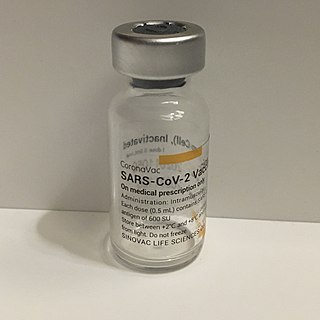
CoronaVac, also known as the Sinovac COVID-19 vaccine, is a whole inactivated virus COVID-19 vaccine developed by the Chinese company Sinovac Biotech. It was Phase III clinical trialled in Brazil, Chile, Indonesia, the Philippines, and Turkey and relies on traditional technology similar to other inactivated-virus COVID-19 vaccines, such as the Sinopharm BIBP vaccine, another Chinese vaccine, and Covaxin, an Indian vaccine. CoronaVac does not need to be frozen, and both the final product and the raw material for formulating CoronaVac can be transported refrigerated at 2–8 °C (36–46 °F), temperatures at which flu vaccines are kept.

Covaxin is a whole inactivated virus-based COVID-19 vaccine developed by Bharat Biotech in collaboration with the Indian Council of Medical Research - National Institute of Virology.

ZF2001, trade-named Zifivax or ZF-UZ-VAC-2001, is an adjuvanted protein subunit COVID-19 vaccine developed by Anhui Zhifei Longcom in collaboration with the Institute of Microbiology at the Chinese Academy of Sciences. The vaccine candidate is in Phase III trials with 29,000 participants in China, Ecuador, Malaysia, Pakistan, and Uzbekistan.

EpiVacCorona is a peptide-based vaccine against COVID-19 developed by the Russian VECTOR Center of Virology. The lack of protective effectiveness of EpiVacCorona, which is still in use in Russia, has been reported in scientific literature and in the media. The vaccine consists of three chemically synthesized peptides that are conjugated to a large carrier protein. This protein is a fusion product of a viral nucleocapsid protein and a bacterial MBP protein. A phase III clinical trial to show whether or not the vaccine can protect people against COVID-19 was launched in November 2020 with more than three thousand participants. The conclusions and results of the trial have not been made public.

SCB-2019 is a protein subunit COVID-19 vaccine developed by Clover Biopharmaceuticals using an adjuvant from Dynavax technologies. Positive results of Phase I trials for the vaccine were published in The Lancet and the vaccine completed enrollment of 29,000 participants in Phase II/III trials in July 2021. In September 2021, SCB-2019 announced Phase III results showing 67% efficacy against all cases of COVID-19 and 79% efficacy against all cases of the Delta variant. Additionally, the vaccine was 84% effective against moderate cases and 100% effective against hospitalization.

The Sanofi–GSK COVID-19 vaccine sold under the brand name VidPrevtyn Beta, is a COVID-19 vaccine developed by Sanofi Pasteur and GSK.

Nanocovax is a Vietnamese COVID-19 vaccine candidate developed by Nanogen Pharmaceutical Biotechnology JSC. It is a subunit vaccine.

The Sinopharm WIBP COVID-19 vaccine, also known as WIBP-CorV, is one of two inactivated virus COVID-19 vaccines developed by Sinopharm. Peer-reviewed results show that the vaccine is 72.8% effective against symptomatic cases and 100% against severe cases. The other inactivated virus COVID-19 vaccine developed by Sinopharm is the BIBP vaccine (BBIBP-CorV) which is comparably more successful. 1 billion doses are expected to be produced per year.

The MVC COVID-19 vaccine, designated MVC-COV1901 and also known as the Medigen COVID-19 vaccine, is a protein subunit COVID-19 vaccine developed by Medigen Vaccine Biologics Corporation in Taiwan, American company Dynavax Technologies, and the U.S. National Institutes of Health.

UB-612 is a COVID-19 vaccine candidate developed by United Biomedical Asia, and Vaxxinity, Inc. It is a peptide vaccine.

A viral vector vaccine is a vaccine that uses a viral vector to deliver genetic material (DNA) that can be transcribed by the recipient's host cells as mRNA coding for a desired protein, or antigen, to elicit an immune response. As of April 2021, six viral vector vaccines, four COVID-19 vaccines and two Ebola vaccines, have been authorized for use in humans.

AWcorna, originally termed ARCoV and also known as the Walvax COVID-19 vaccine, is an mRNA COVID-19 vaccine developed by Walvax Biotechnology, Suzhou Abogen Biosciences, and the PLA Academy of Military Science. In contrast to other mRNA COVID vaccines, such as those by Pfizer-BioNtech and Moderna, this vaccine primarily targets the Sars-CoV-2 receptor-binding domain of the spike protein, rather than the entire spike protein. It is approved for Phase III trials in China, Mexico, Indonesia, and Nepal.

NDV-HXP-S is a COVID-19 vaccine candidate developed under the leadership of Peter Palese, Adolfo García-Sastre, and Florian Krammer at the Icahn School of Medicine at Mount Sinai.

COVAX-19 is the result of a collaboration between Vaxine and CinnaGen, a private company with operations in the Middle East. COVAX-19 is a recombinant protein-based COVID-19 vaccine developed by South Australian-based biotech company Vaxine. It is under clinical trial in collaboration with the Iranian company CinnaGen.

COVID-19 vaccine clinical research uses clinical research to establish the characteristics of COVID-19 vaccines. These characteristics include efficacy, effectiveness and safety. As of November 2022, 40 vaccines are authorized by at least one national regulatory authority for public use:

Noora is a COVID-19 vaccine candidate developed by Baqiyatallah University of Medical Sciences in collaboration with Plasma Darman Sarv Sepid Co. in Iran.

Soberana Plus, technical name FINLAY-FR-1A, is a COVID-19 candidate vaccine produced by the Finlay Institute, a Cuban epidemiological research institute.

S-268019-b is a protein subunit COVID-19 vaccine candidate developed by Shionogi.

KD-414 is a COVID-19 vaccine candidate developed by Japanese biotechnology company KM Biologics Co. Results of a phase 1/2 clinical trial for this vaccine were released as a preprint in June 2022.

Sinopharm NVSI COVID-19 vaccine, also known as mutI-tri-RBD or NVSI-06-08, is a COVID-19 vaccine developed by National Vaccine & Serum Institute, a subsidiary of CNBG of Sinopharm.






